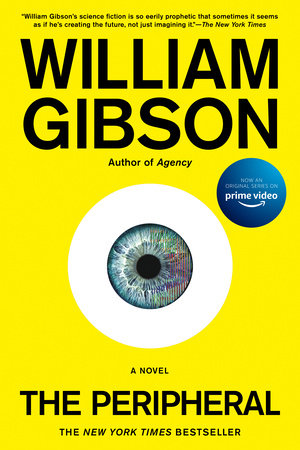
It harks back in many ways to Neuromancer and its sequels in terms of the level of science fiction in it. Some of the books he wrote in-between felt so close to the near future that they almost seemed mainstream, but The Peripheral incorporates a not-too-distant very different future.
It is, of course, beautifully written. Gibson has always been an excellent writer. I wasn’t a big fan of a lot of the cyberpunks, but back in the 80s, when I was mostly catching up on the great feminist SF of the 70s, I also read him.
And like some other writers who’ve been at this a long time (I’ve commented before about this with respect to Kim Stanley Robinson and Karen Joy Fowler), he’s just gotten better with age. You get the feeling that everything he’s done in the book is deliberate.
He did what he wanted to do.
The thing is that, despite the fact that I’m not inclined to believe in conspiracies — which is to say, I know people conspire, but I don’t believe in big complicated ones that involve things just beyond our ken, as a rule — I’m starting to feel like we’re living in Gibson’s world.
I don’t think this is just because it’s a well-written story set in a plausible future. I think it’s because the news is full of things that are very close to what happens in this book.
I’m starting to feel like I live in a world where things are out to get us and we don’t even know they’re happening.
Or maybe I feel like we do know a lot of them are happening, but the people in a position to do something to stop them refuse to believe that they’re happening, or at least refuse to believe that we need to stop them.
The people in power are playing by the rules, but everything has shifted and the rules don’t really apply anymore. Which is as good a description of a Gibson novel as I can imagine.
In our real world the tech’s not so good that you can put a human being into a “peripheral” — a body that you can send out in the world to do business for you while you are somewhere else.
But between very real financial manipulation in the investment world, not to mention the crypto Ponzi schemes, it doesn’t take much of a leap to buy into the idea that someone can change a whole town’s economy very quickly — and destroy it just as fast.
And just look at all the women in our always-connected world who have decided to delete period apps from their phones because of the anti-abortionists taking advantage of the extremist supreme court’s ruling in Dobbs. They have a legitimate fear of such apps being used to persecute (and prosecute) them.
We’re being spied on by corporations everywhere and also by governments. And drones get scarier by the day.
I used to say I wasn’t a Luddite, meaning that I wasn’t someone who didn’t want to see tech progress. But when you actually look back at the Luddites, what they were trying to stop was the abuse of workers.
It wasn’t that they didn’t want better machines; it was that they didn’t want to lose their livelihoods. And the people bringing in the machines had every intention of making it harder for people to make a living.
(Contrast Amazon using robots to speed up the work so that the people in the jobs are more likely to get hurt with the automated looms the weavers were worried about. Not so different, those Luddites.)
We’re seeing a lot of that now. We’re also seeing a real growth in union organizing to fight back against the abuse of workers. People are resisting.
So I guess I am a Luddite, in a way. I want to see the benefits of tech — there are all kinds of things we actually need in the world, like highly efficient electrical appliances so we can cook meals and heat and cool our homes without using so much energy — but I don’t want to see a world in service to a few tech billionaires.
Which is to say, I don’t want to live in any version of the future Gibson is playing with. He probably doesn’t either.
I recommend The Peripheral highly. I plan to read the sequels.

I reread this, and Agency about six months ago, and I share this reaction. He pays a lot of attention to what’s going on, and picks out specific details. I think it works because he doesn’t get encyclopedic about it–but he also has an instinct for current events. In the case of these books, that gets scary.
Very scary in the way an encyclopedic list would not be. So very good writing coupled with attention to what’s going on equals more things to worry about.
I have to get a copy of Agency. It isn’t available as a library ebook, for some reason — the audiobook is, but I only like audiobooks for long drives.